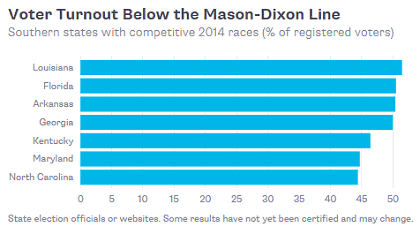 A few weeks ago, Francis Barry, whose bio identifies him as having "previously served as Director of Public Affairs and Chief Speechwriter for New York City Mayor Michael R. Bloomberg," had a piece published by Bloomberg View (the op-ed arm of the Bloomberg News outlet), portending to examine whether Photo ID voting laws had an adverse effect on turnout this year.
A few weeks ago, Francis Barry, whose bio identifies him as having "previously served as Director of Public Affairs and Chief Speechwriter for New York City Mayor Michael R. Bloomberg," had a piece published by Bloomberg View (the op-ed arm of the Bloomberg News outlet), portending to examine whether Photo ID voting laws had an adverse effect on turnout this year.
Specifically, as the very first paragraph of his piece explained, Barry claims to have been looking at whether "voter identification laws suppress turnout" since, as he opined in the same graf, "Liberals" argue "not all citizens have the type of ID that many states now require at the polls."
The piece, headlined "Quit Blaming Low Turnout on Voter ID", went out of its way to make the case that such laws had nothing to do with turnout this year, as some states with such laws even saw higher turnout than others without them. While one could attempt to make such an argument, in this case, unfortunately, Barry used extraordinarily deceptive data and moving goal posts in order to do so, as detailed in the emails (posted below) between me, him and one of his editors.
The main trick he employed was an apples to oranges comparison of turnout rates in "21 states that had a competitive gubernatorial or Senate race", where, he misleadingly claimed, "Fourteen of the 21 states had a voter ID requirement in place, while seven didn't".
But here's the thing. Barry deceptively swapped the type of very specific Photo ID laws cited in his first paragraph, with very non-restrictive ID laws that are in use without objection in many states.
When I explained all of this in detail to him and his editors via email (all posted below), the response I received back was, as I noted, "mind-boggling, to be frank"...
The strict Photo ID laws in question --- the ones that "Liberals" are concerned about and where the U.S. Dept. of Justice and many voting rights organizations have been forced to file suit --- are those where hundreds of thousands of registered voters do not have "the type of ID" (as Barry describes it) now required to vote in states like Texas and Wisconsin, where the GOP passed very strict new laws that bars the right to vote to all but those with one of a handful of very specific types of state-issued Photo ID cards.
For example, Texas has required ID for every single voter at the polls for more than a decade. It has only been since implementing their strict new Photo ID law that voting rights advocates have sued (and where the federal judge who tried the case recently determined 600,000 legally registered voters were likely to be disenfranchised by the new law she found to be "purposefully discriminatory" and "unconstitutional".)
Most of the states Barry cited in his article do not actually have strict Photo ID laws. While a majority of states in the nation now have some form of ID requirement for voters (and ID has long been required for voter registration in all 50 states under federal law), the bulk of those ID laws are largely reasonable, in that they are not exclusionary. Most such laws allow for a very wide array of potential forms of ID that the voter may show before voting (such as bank statements, utility bills, paycheck stubs, etc.), as an alternative to the strict, state-issued Photo ID requirements opposed by voting rights advocates, as enacted only in GOP-controlled states. Alternately, some of the non-restrictive laws also allow voters to cast normal ballots, for example, by simply signing an affidavit stating they are who they claim to be, in the event that the voter doesn't have one of the many allowable forms of ID in those states.
Barry, however, took all of those states into his comparison --- even those without strict Photo ID requirements --- in his attempt to argue that "Hey! Look! ID requirements don't hamper turnout at all!"
Having accomplished his sleight of hand with the two very different types of ID laws, he then makes things even worse by citing high turnout rates this year in places like Arkansas --- even though their state Supreme Court actually struck down the GOP's strict Photo ID voting restriction earlier this year, finding it to be a violation of the state Constitution's "Right to Vote" clause! Barry disingenuously cites a law that wasn't even in place, in order to make his argument (and, as remarkably, then claimed he meant to do so when I called him on it!)
He goes on to use similarly misleading information to mischaracterize the type of ID laws and turnout rates in states such as Florida, New Hampshire, Louisiana and elsewhere (as I detail in our emails below.)
Finally, Barry then wraps up all of that entirely faulty information in order to support his conclusion that opponents of such laws "would do well to spend more time motivating voters and less time bemoaning ID laws."
All-in-all, pretty breathtakingly dishonest, it seems to me. But Barry and the editors at Bloomberg Views, apparently, disagree.
I sent a polite letter of complaint to Barry and his editor Christopher Flavelle (their email addresses are included at the end of Barry's original article), pointing out the completely erroneous data and the wholly misleading argument and conclusion that followed on it, suggesting they either correct, or even better, retract the entire article.
Incredibly, after a fairly lengthy back and forth with both of them --- and an additional review, they claim, by a second (unnamed) editor --- Bloomberg has determined that no retraction, nor even correction, is necessary at all. Despite having requested I detail my specific concerns, they offered no specific response to the detailed critique.
You can decide for yourself who has it right in this matter. Here's the link to Barry's original piece at Bloomberg, and my detailed emails back and forth (very lightly edited) with both Barry and his editor Flavelle follow in full below...
Sent: Thursday, December 04, 2014 4:47 PM
To: Christopher Flavelle; Frank Barry
Subject: Errors in Voter ID story
Your story yesterday on Photo ID voting restrictions was incredibly misleading, not to mention filled with all kinds of errors.
For one, Arkansas' Photo ID restriction was found unconstitutional by the state Supreme Court before the election. In other words, they didn't have such a restriction in this election, despite your claim and chart to the contrary.
Several other states you cited had ID laws, but not the strict type of Photo ID laws restrict voters from voting in the event they don't have a handful of specific types of Photo ID.
The complaint by those who oppose strict polling place Photo ID voting restrictions is not about states which ask for ID, but let you vote any way (signing an affidavit, for example, that you are who you are), but those which don't allow you to vote on a normal ballot at all (forcing you to vote provisionally, for example) if you don't have very very specific types of Photo IDs.
Those states that require IDs, but allow a broad range of them, such as utility bills, paycheck stubs, government letters, etc., are not a problem and few have ever complained about that. Including them in your article to pretend to help readers determine whether or not STRICT Photo ID laws suppressed turnout in 2014, as many voting rights advocates claim, is extraordinarily dishonest and misrepresentational.
Finally, surely you know that, ultimately, whether such laws swing elections or not is the least important matter here. What matters most is the blatant theft of the fundamental right that protects all others in this nation. If Republicans and those in favor of strict polling place Photo ID restrictions actually cared about such rights, as they often pretend, they would be first in line to oppose that type of unnecessary and offensive disenfranchisement.
In any event, your article is full of errors and should be corrected.
Brad Friedman
Publisher/Editor, The BRAD BLOG
http://www.BradBlog.com
Sent: Friday, December 05, 2014 9:47 AM
To: Christopher Flavelle; Brad Friedman
Subject: Re:Errors in Voter ID story
Dear Mr. Friedman:
Thank you for reading my piece on on voter turnout and voter ID.
There are, of course, various kinds of voter ID laws, some stricter than others, and you are right that strict photo ID laws are the most objectionable to critics. But many also object to other forms of ID laws, considering them to be restrictions on the ballot.
The point of my article was not to offer an opinion on whether ID laws are a good or bad thing, but rather to look at what turnout in the 2014 elections might tell us about them.
The newly passed Arkansas photo ID law was not in place, as you note, but Arkansas is among the states that had enacted some ID provisions above what is required by HAVA (Help American Vote Act). In any event, dropping it out of the list of southern states would not change the fact that North Carolina and Maryland finished at the bottom of the pack, behind states that require ID of all voters, including several (Florida, Georgia, and Louisiana) that require photo ID.
Here is a map of voter ID laws, in case you are interested.
http://www.ncsl.org/rese...-campaigns/voter-id.aspx
Turnout is a complicated issue, affected by many variables. I don't expect to convince you that voter ID laws are good - and indeed, I wasn't making that argument. But I do think the data is worth looking at. I'm sorry that you didn't care for my analysis, but thank you again for reading it.
Best,
Frank
Sent: Friday, December 05, 2014 2:24 PM
To: 'Frank Barry'; Christopher Flavelle
Subject: RE: Errors in Voter ID story
The fact is, your article is riddled with inaccuracies and misleading assertions. I'm in meetings for the next several hours, but will attempt to offer a more specific response later tonight.
I'm shocked it made it through the fact-check procedure, if there are any, at Bloomberg, to be frank. But a more specific response a bit later. Thanks for your reply here (and via Twitter.)
Brad
Sent: Friday, December 05, 2014 2:26 PM
To: 'Frank Barry'; Brad Friedman
Subject: RE: Errors in Voter ID story
Brad, I edited Frank's piece. Thanks for reading, and for your feedback. If you feel there are specific inaccuracies in the piece, beyond the Arkansas case that Frank addressed in his email, please point them out and we'll take a look.
Best,
Chris
Sent: Friday, December 05, 2014 10:50 PM
To: Frank Barry (BLOOMBERG/ 731 LEX -), Christopher Flavelle (BLOOMBERG/ NEWSROOM:)
Subject: RE: Errors in Voter ID story
Thank you again, Frank, and Christopher as well, for the earlier replies. Once again, my apologies that I wasn't able to respond in full until now, as I've been in meetings largely all day.
First, to respond to a few points in Frank's response below, and then a more complete response to the errors, misleading information and sleight of hand in the piece itself.
FROM FRANK'S REPLY...
There are, of course, various kinds of voter ID laws, some stricter than others, and you are right that strict photo ID laws are the most objectionable to critics. But many also object to other forms of ID laws, considering them to be restrictions on the ballot.
If that is the case, you neither noted that point, nor offered any evidence to back it up. In fact, I suspect it was neither noted nor backed up, because any such evidence is scant at best. As I noted in one of our several different Twitter conversation threads, I must have missed the lawsuits filed against the "other forms of ID laws" you cited.
The lawsuits I'm aware of (and I've been on this beat for over a decade) had to do with the strict forms of Photo ID restrictions in places like TX, NC, PA, WI, and AR, all of which (except NC, which has yet to see a trial) found that the laws were in violation of the U.S. Constitution, the Voting Rights Act and/or the particular state constitution. Similarly, in other states where such suits were filed in the past (MO, GA, IN), it was over strict polling place Photo ID restrictions requiring the type of ID that many voters (some 20 million registered voters across the country) simply do not own.
I believe Frank knows that very well, since he mentions as much in his very first graf, before his sleight of hand, but more of that in a moment.
The point of my article was not to offer an opinion on whether ID laws are a good or bad thing
You have an odd way of making that point, by misrepresenting the laws in effect in the states you cite and by linking to a clearly pro-Photo ID piece in the sentence reading "Both sides point to studies that support their case." Linking to an article headlined "Voter ID Laws Suppress White, Latino, and Black Voting About the Same Amount" is very Fox "News" fair and balanced of you.
The newly passed Arkansas photo ID law was not in place, as you note, but Arkansas is among the states that had enacted some ID provisions above what is required by HAVA (Help American Vote Act). In any event, dropping it out of the list of southern states would not change the fact that North Carolina and Maryland finished at the bottom of the pack, behind states that require ID of all voters, including several (Florida, Georgia, and Louisiana) that require photo ID.
Here is a map of voter ID laws, in case you are interested.
Thank you for that link. I'll work from it in a moment to point out how erroneous a number of your claims made both above and in the article itself were.
Turnout is a complicated issue, affected by many variables. I don't expect to convince you that voter ID laws are good - and indeed, I wasn't making that argument. But I do think the data is worth looking at.
Me too. And, indeed, turnout is a complicated issue. Telling your readers, however, as you do in the headline (which I appreciate you may not have written) that "Voter ID" had no effect on turnout is disingenuous at best, given the data we do have, the data you seem to have not mentioned (even though you linked to some of it), not to mention the data we don't have yet at all, as you somewhat noted.
For the record, I am not making the argument here that Photo ID restrictions effected the results of any particular race in any particular state. Nor am I even particularly interested in arguing how much or how little it effected turnout. One reason for that is because we are unlikely to ever know how many people simply didn't bother to show up at all in states where they knew they wouldn't be allowed to vote (that is a number that is usually overlooked in studies of strict Photo ID restrictions, which tend to look at things like increases in provisional ballots cast, etc. to make their assessments.)
The most important issue here, as I mentioned in my initial note, is that rights are stolen from voters unable to vote because they lack the TYPE of ID that is now required by these ENTIRELY Republican laws. Americans concerned about rights ought to be offended by such laws, whether they change the results of any race, or deny the votes of 10 people or 20 million people.
You are, of course, welcome to an opinion to the contrary, which I certainly do not begrudge you. You are not welcome, however, to use misleading and erroneous facts to support that opinion. So, let's move on to some of those.
FROM FRANK'S ARTICLE...
The first sleight of hand, which makes the rest of the entire article misleading at very best is moving the goal posts from the argument that "Liberals tend to say...not all citizens have the type of ID that many states now require at the polls" (first graf) to become "21 states had a voter ID requirement in place, while seven didn't" (third graf).
Setting aside the "Liberals" argument (unless folks like the League of Women Voters and conservative Reagan-appointed federal Judge Richard Posner are now "liberals"), it's clear you understand, from the very first graf, that the concern about these laws is about having the TYPE OF ID required to vote, not simply any old ID requirement which most states have in place without a problem. (Along with the ID requirements of all 50 states for registration.)
Yet, by graf 3, you've moved the goal posts to reference "21 states" with "a voter ID requirement", even though the vast majority of those states do NOT require the narrow TYPE of strict Photo ID found objectionable (leading various organizations "liberal" and otherwise, to sue to block them).
For example, Frank writes in his article [including the following graphic]:
The states with a voter ID requirement, including Louisiana and Florida, had the highest turnout rates; the two states where no ID is required --- Maryland and North Carolina --- had the lowest.
Okay, let's start at the top there. As noted by your own emailed link, Louisiana has "non-strict" Photo ID requirements. As the NCSL [National Conference of State Legislatures] notes at that link, if the voter doesn't have one of the IDs required in LA, they may vote by simply signing an affidavit to that end and providing a date of birth. That's it. So why would that law depress turnout in Louisiana at all, as you misleadingly suggest it otherwise would if "Liberals" were right?
Next state that you trumpet as proving those "Liberals" wrong is Florida where, guess what? They don't have strict Photo ID requirements either! Once again, the same emailed link you sent shows that if voters in FL do not have the type of ID required (which is much broader than the controversial strict Photo ID states) voters can vote without a problem. Only their signatures need to match the one they gave when registering to vote. So, again, virtually nobody is kept from voting due to ID issues in Florida law.
Next, on to your third success story in the south, Arkansas. As your own emailed link makes very clear near the very top of the page (emphasis added):
The Arkansas Supreme Court struck down on Oct. 15 Arkansas' 2013 strict photo voter ID law. A previous law requesting but not requiring an ID will be in effect.
Further down the page, it specifically cites Arkansas as a state with "Non-strict", "Non-Photo ID" requirements. Citing Arkansas in your list of Southern states with a high turnout, even though they had an ID law in effect that kept no one from voting (other than those turned away by poll workers illegally enforcing the law found by the state Supreme Court to be a vilation of the state's Constitutional right to vote) is extraordinarily misleading, just as citing Louisiana and Florida above it, as states with ID laws but great turnout anyway!
Moving on to Georgia, where they do have a strict Photo ID law, even if it is far less egregious than the most controversial ones such as TX, NC, AR, WI etc., and where their law has been in effect since 2008, one of the first in the nation to enact such a law. So folks have had at least six years to obtain an ID needed to vote in that state. Nonetheless, you don't mention GA in the rest of the piece, other than in the chart, in an apparent attempt to buttress your misleading argument that "The states with a voter ID requirement, including Louisiana and Florida [and apparently Arkansas] had the highest turnout rates," which, of course, suggests that Photo ID requirements can be great for turnout!
Moving down through your chart, neither Kentucky, Maryland nor North Carolina have strict Photo ID requirements in effect either, though NC was allowed to kill their long-successful same day/election day registration program, as well as a big chunk of early voting time (that'll be important in a moment.)
Suggesting as you do that "the two states where no ID is required --- Maryland and North Carolina --- had the lowest" turnout is an extraordinary disservice to your readers, especially without noting that NC gutted same day registration (thanks to SCOTUS at the very last moment) and that MD, unlike GA and FL and NC and LA, didn't have any particularly hot race on the ballot at all.
So, the chart is COMPLETELY misleading in almost every respect, as is the text leading up to it and following it. It should be retracted with an explanation.
Next, you sniff away the idea that, "even if it is accurate," the claim that 50,000 voters may have been turned away due to suppressive laws in NC, unrelated to Photo ID laws, "it depressed turnout by less than 1 percent." You are certainly welcome to argue that 50,000 voters who lost their right to vote is no big deal, if you like, but given the number of races we have decided by less than 1 percent and given the fact that Photo ID proponents argue that even a few cases of voter impersonation can flip a race, it seems odd to belittle the loss of 50,000 votes. Is there any chance (in hell?) that 50,000 fraudulent votes might have been deterred by strict Photo ID restrictions in any state at any time? If not, then why would you seemingly support Photo ID, but pooh-pooh the potential loss of the right to vote for as many as 50,000 in a single state in that instance?
Another way to test the question of whether voter ID requirements suppress turnout is to examine states that adopted ID laws after 2010. Did turnout in those states go down? Only two states with new ID laws also had competitive elections in both 2010 and 2014: Kansas and New Hampshire. Turnout increased in both: by one point in Kansas, and by more than nine points in New Hampshire.
First, as your emailed NCLS link conveniently explains once again, NH has non-strict, non-Photo ID requirements. It allows for a HUGE array of ID types and, lacking that, a voter may simply sign an affidavit and, according to the page, "The voter may then cast a regular ballot."
Citing increased turnout "by more than nine points in New Hampshire", when nobody was turned away by their ID laws is extraordinarily misleading and, frankly, just completely erroneous.
In Kansas, you finally found a place with strict Photo ID and increased turnout! That turnout increase, however, was just 1 percent (an amount you pooh-poohed when it was the amount of those turned away in NC) and it was undoubtedly due to a suddenly very competitive race for the U.S. Senate and another for Governor --- neither of which occurred in 2010, the year you are comparing 2014 to in that instance.
You then go on to cite Maine as having the highest turnout in the country among the 21 states you describe as having "competitive elections", even though, as you admit, "Maine has no ID requirement and allows voters to register on Election Day". Finally, you have correctly identified the type of voting requirement in a state, and the positive effect it appears to have had on turnout. But it's quickly dismissed to move on to New Hampshire yet again (already discussed above --- an ID law that turns nobody away) and Alaska, which has very lax non-Photo ID requirements, including "Current utility bill, bank statement, paycheck, government check or other government document with the voter's name and address" and the ability for poll workers to waive even those requirements if poll workers know the voter, which is likely the case in most places in AK.
So the three highest turnout states, from among those you cite as having competitive races, do not have strict Photo ID requirements --- even though your article is otherwise misleadingly headlined "Quit Blaming Low Turnout on Voter ID".
If you actually used FACTS in your article, you might have had every reason to, yes, blame lowered turnout on strict Voter ID requirements!
Don't worry. We're almost done.
In a recent poll by the Pew Research Center of nonvoters, 87 percent of respondents said they were too busy to do so, unhappy with their choices or otherwise indifferent. Ten percent cited a missed registration deadline, a recent move or a lack of transportation.
Holy cow! 87 percent didn't vote because they "they were too busy to do so, unhappy with their choices or otherwise indifferent." That suggests most folks are just too lazy to make time to vote!
But let's look at what the Pew poll that you cite actually says:
Oh. Of those 87% that you bunched together, the overwhelming number --- 67% --- didn't vote because they were too busy with work or school or were out of town, etc. I wonder if they'd have had a better chance to vote in places like NC and FL if those states hadn't shortened early voting?
That overwhelming 67% number kinda gets hidden when you add in the 20% who "didn't like the choices/didn't care" etc. The fact is, the vast majority who didn't vote, said it was because of "Time" issues, something that would be greatly eased with more access to the polls, such as early voting, etc.
But then you go on to cite 'only' a tiny 10% who "missed registration deadline" (how many in NC thought they'd be able to register on election day?) or had "recently moved" (so may not have had Photo ID allowing them to vote where they recently moved to) or had "no transportation" (meaning they probably didn't have a Drivers License and may not have been able to vote because of it in strict Photo ID states). But, hey, it was only 10% versus a whopping 87% (when you combine numbers misleadingly) that had other, non-Photo ID reasons for not voting.
Lack of ID did not register in the poll, probably because even registered voters without ID can cast provisional ballots, which are counted if the voters later establish that they were eligible to participate.
Well, we don't know that, since "recently moved" and "no transportation" could be another way of saying "I don't have the type of Photo ID now required". But, either way, even if we take your assertion there as fact, it's also incredibly misleading if not outright inaccurate.
You took a poll of eligible voters in all 50 states to make the case that few didn't vote because of strict Photo ID restrictions.
Well, those who went to vote but didn't have ID, were likely able to cast a provisional ballot (that didn't get counted, because they lacked ID) and would not have been counted among Pew's poll of those who didn't vote, as you note.
More importantly though, there are only 7 of 50 states with strict Photo ID requirements (the kind which, recall at the beginning of your piece, you said "Liberals" opposed because, "not all citizens have the type of ID that many states now require at the polls"). It's unclear which states comprise your full list of 21 with competitive races, but of the 7 states in your emailed NCSL link, at best only 4 of them (GA, KS, TX, VA) are likely among those 21.
That means Pew's poll of 50 states included voters in only 4 states with strict Photo ID, and yet you use what would be a tiny number at best (out of voters from all 50 states) to argue that "Lack of ID did not register in the poll". Of course it didn't. It would be a tiny percentage of a tiny percentage of a tiny percentage, when using a base of all 50 states. Yet, if you misleadingly argue that 21 states had such laws (they don't), rather than just 4, then you've sealed the deal and completely misled Bloomberg readers.
Congrats on that. At least the "voter fraud" fraudsters at True the Vote were happy to cite the article on Twitter. But, other than that, it does an extraordinary disservice to voters, to democracy and to Bloomberg readers.
And yet, as you conclude, Democrats should stop whining about "the type of ID that many states now require at the polls", accept the completely inaccurate "facts" you use to rebut a totally different argument, and just "spend more time motivating voters and less time bemoaning ID laws."
I'm sorry to say that's not editorializing, Frank. That's just a lot closer to lying. I'm sorry to be so blunt about it, but after nearly 11 years on this beat, I get really frustrated by seeing rights so casually written away, particularly with completely erroneous "facts" to support it.
I hope Christopher (or the other Bloomberg editors) will retract the misleading article along with an explanation posted on the existing page, as to why.
Please feel free to let me know if you have any questions, and thank you again for responding to my initial email on this regrettable matter.
Brad
Sent: Monday, December 08, 2014 6:08 AM
To: Frank Barry (BLOOMBERG/ 731 LEX -), Brad Friedman
Subject: RE: Errors in Voter ID story
Brad, thanks again for your comments. Having reviewed them, I don't feel any of this calls for a correction, as I don't see anything in Frank's piece that's factually inaccurate. You're welcome to disagree with the way he's interpreted the data, but that's a separate issue and one that doesn't point to a correction.
If you'd like me to have a second editor look at your email, I can ask one to do so.
Best,
Chris
Sent: Monday, December 08, 2014 10:41 AM
To: Christopher Flavelle
Cc: Francis Barry
Subject: Re: Errors in Voter ID story
Chris -
Yes, I think another editor should definitely give it a look. I have no idea how you (or Frank) can justify citing non-strict voter ID laws --- specifically written to NOT disenfranchise any voters, unlike the controversial strict Photo ID restrictions voting rights advocates are fighting against --- as evidence to support the claim that those strict ID laws had no effect on turnout.
That response is mind-boggling, to be frank.
So, thanks in advance for seeking a second editorial opinion and for letting me know about it.
Best,
Brad
Sent: Monday, December 08, 2014 10:52 AM
To: Brad Friedman
Cc: Francis Barry
Subject: Re: Errors in Voter ID story
OK, I'll get back to you.
Sent: Wednesday, December 10, 2014 2:08 PM
To: Brad Friedman
Cc: Francis Barry
Subject: Re: Errors in Voter ID story
Brad, a second editor has looked at your complaints, and she agrees with me that no corrections are warranted. Thanks all the same for sharing your concerns.
Best,
Chris
(Snail mail support to "Brad Friedman, 7095 Hollywood Blvd., #594 Los Angeles, CA 90028" always welcome too!)
|


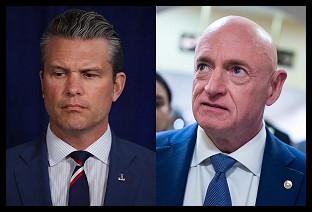 Court Blocks Hegseth Censure of Sen. Mark Kelly
Court Blocks Hegseth Censure of Sen. Mark Kelly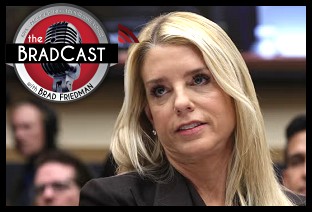 Harpy Tantrums, Legal Losses, Election Fails, Retreating ICE and Other Hopeful Signs: 'BradCast' 2/12/26
Harpy Tantrums, Legal Losses, Election Fails, Retreating ICE and Other Hopeful Signs: 'BradCast' 2/12/26 'Green News Report' 2/12/26
'Green News Report' 2/12/26
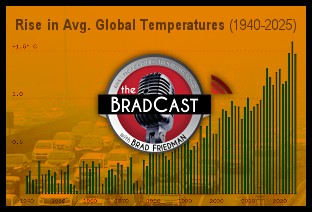 'Let Kids with Asthma Suffer': Trump to Reverse EPA's Landmark 'Endangerment Finding': 'BradCast' 2/11/26
'Let Kids with Asthma Suffer': Trump to Reverse EPA's Landmark 'Endangerment Finding': 'BradCast' 2/11/26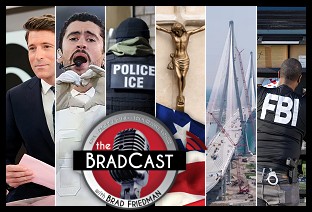 Trump's Presidency Now About Little More Than Racism, Corruption, Culture War Nonsense: 'BradCast' 2/10/26
Trump's Presidency Now About Little More Than Racism, Corruption, Culture War Nonsense: 'BradCast' 2/10/26 'Green News Report' 2/10/26
'Green News Report' 2/10/26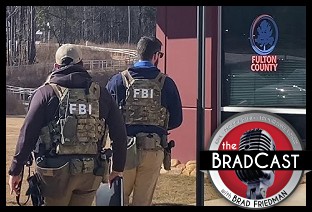 About Trump's FBI Raid of the Fulton County, GA Elections Warehouse: 'BradCast' 2/9/26
About Trump's FBI Raid of the Fulton County, GA Elections Warehouse: 'BradCast' 2/9/26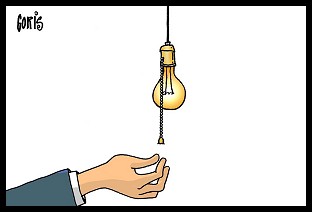 Sunday 'Dead in Darkness' Toons
Sunday 'Dead in Darkness' Toons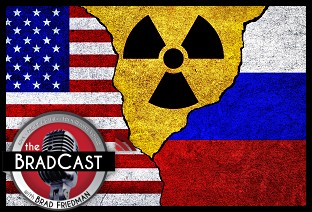 'New START' Treaty Allowed to End Amid New World Disorder: 'BradCast' 2/5/26
'New START' Treaty Allowed to End Amid New World Disorder: 'BradCast' 2/5/26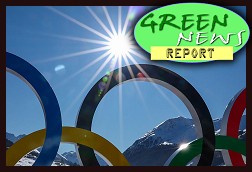 'Green News Report' 2/5/26
'Green News Report' 2/5/26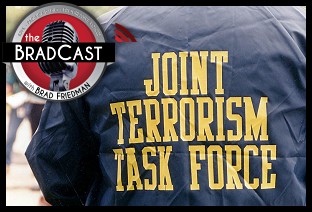 Trump Turns 'War on Terror' Tools Against Domestic Political Foes: 'BradCast' 2/4/26
Trump Turns 'War on Terror' Tools Against Domestic Political Foes: 'BradCast' 2/4/26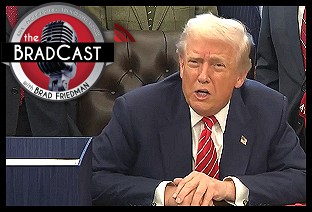 Losing Legally and Politically, Trump Threatens to 'Nationalize' Elections: 'BradCast' 2/3/26
Losing Legally and Politically, Trump Threatens to 'Nationalize' Elections: 'BradCast' 2/3/26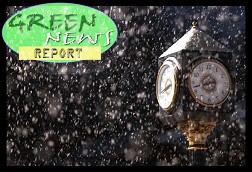 'Green News Report' 2/3/26
'Green News Report' 2/3/26 Bad and Good Bunnies, and an Electoral Shock in Deep 'Red' TX: 'BradCast' 2/2/26
Bad and Good Bunnies, and an Electoral Shock in Deep 'Red' TX: 'BradCast' 2/2/26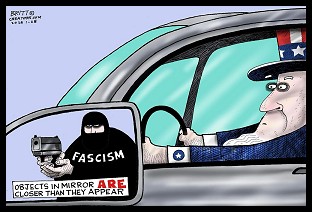 Sunday 'Mirror, Mirror' Toons
Sunday 'Mirror, Mirror' Toons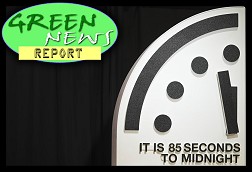 'Green News Report' 1/29/26
'Green News Report' 1/29/26 It's About Elections and the Windmills of His Mind: 'BradCast' 1/29/26
It's About Elections and the Windmills of His Mind: 'BradCast' 1/29/26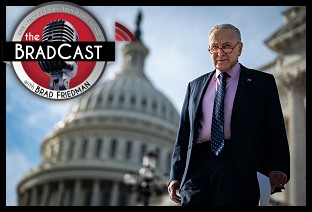 Govt Shutdown Over ICE Funding Near Certain This Weekend: 'BradCast' 1/28/26
Govt Shutdown Over ICE Funding Near Certain This Weekend: 'BradCast' 1/28/26 Trump Blinks, Bovino Out, MN Op Falters, Persists as Midterms Loom: 'BradCast' 1/27
Trump Blinks, Bovino Out, MN Op Falters, Persists as Midterms Loom: 'BradCast' 1/27  The ICE Murder of ICU Nurse Alex Pretti and the Heroes of Mpls: 'BradCast' 1/26/26
The ICE Murder of ICU Nurse Alex Pretti and the Heroes of Mpls: 'BradCast' 1/26/26 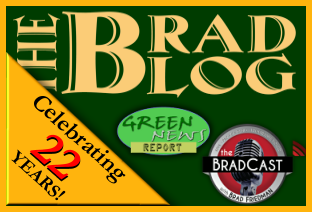 The BRAD BLOG: 22 Years and Still Counting
The BRAD BLOG: 22 Years and Still Counting Mr. Smith Testifies (Publicly) in Washington: 'BradCast' 1/22/26
Mr. Smith Testifies (Publicly) in Washington: 'BradCast' 1/22/26 World Turning Against Self-Destructing U.S. Under Trump: 'BradCast' 1/21/26
World Turning Against Self-Destructing U.S. Under Trump: 'BradCast' 1/21/26 Trump Waste, Fraud, Abuse on Voting, at DOJ, by DOGE: 'BradCast' 1/20/26
Trump Waste, Fraud, Abuse on Voting, at DOJ, by DOGE: 'BradCast' 1/20/26
 VA GOP VOTER REG FRAUDSTER OFF HOOK
VA GOP VOTER REG FRAUDSTER OFF HOOK Criminal GOP Voter Registration Fraud Probe Expanding in VA
Criminal GOP Voter Registration Fraud Probe Expanding in VA DOJ PROBE SOUGHT AFTER VA ARREST
DOJ PROBE SOUGHT AFTER VA ARREST Arrest in VA: GOP Voter Reg Scandal Widens
Arrest in VA: GOP Voter Reg Scandal Widens ALL TOGETHER: ROVE, SPROUL, KOCHS, RNC
ALL TOGETHER: ROVE, SPROUL, KOCHS, RNC LATimes: RNC's 'Fired' Sproul Working for Repubs in 'as Many as 30 States'
LATimes: RNC's 'Fired' Sproul Working for Repubs in 'as Many as 30 States' 'Fired' Sproul Group 'Cloned', Still Working for Republicans in At Least 10 States
'Fired' Sproul Group 'Cloned', Still Working for Republicans in At Least 10 States FINALLY: FOX ON GOP REG FRAUD SCANDAL
FINALLY: FOX ON GOP REG FRAUD SCANDAL COLORADO FOLLOWS FLORIDA WITH GOP CRIMINAL INVESTIGATION
COLORADO FOLLOWS FLORIDA WITH GOP CRIMINAL INVESTIGATION CRIMINAL PROBE LAUNCHED INTO GOP VOTER REGISTRATION FRAUD SCANDAL IN FL
CRIMINAL PROBE LAUNCHED INTO GOP VOTER REGISTRATION FRAUD SCANDAL IN FL Brad Breaks PA Photo ID & GOP Registration Fraud Scandal News on Hartmann TV
Brad Breaks PA Photo ID & GOP Registration Fraud Scandal News on Hartmann TV  CAUGHT ON TAPE: COORDINATED NATIONWIDE GOP VOTER REG SCAM
CAUGHT ON TAPE: COORDINATED NATIONWIDE GOP VOTER REG SCAM CRIMINAL ELECTION FRAUD COMPLAINT FILED AGAINST GOP 'FRAUD' FIRM
CRIMINAL ELECTION FRAUD COMPLAINT FILED AGAINST GOP 'FRAUD' FIRM RICK SCOTT GETS ROLLED IN GOP REGISTRATION FRAUD SCANDAL
RICK SCOTT GETS ROLLED IN GOP REGISTRATION FRAUD SCANDAL VIDEO: Brad Breaks GOP Reg Fraud Scandal on Hartmann TV
VIDEO: Brad Breaks GOP Reg Fraud Scandal on Hartmann TV RNC FIRES NATIONAL VOTER REGISTRATION FIRM FOR FRAUD
RNC FIRES NATIONAL VOTER REGISTRATION FIRM FOR FRAUD EXCLUSIVE: Intvw w/ FL Official Who First Discovered GOP Reg Fraud
EXCLUSIVE: Intvw w/ FL Official Who First Discovered GOP Reg Fraud GOP REGISTRATION FRAUD FOUND IN FL
GOP REGISTRATION FRAUD FOUND IN FL



















